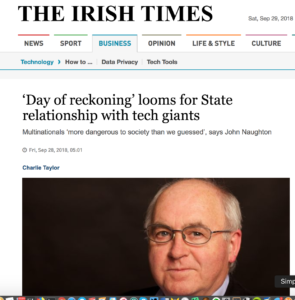Last Friday’s Irish Times carried a piece by Charlie Taylor based on an an interview I gave in which I argued that a country that had built its identity (and prosperity) largely on a policy of being nice to big multi-national companies might need a new narrative now that some of its more welcome guests turn out to be toxic.
Tories in La-la-land
The current Tory Party conference is a surreal event. Robert Shrimsley is there for the Financial Times and he finds the collected faithful unable to talk about anything other than… Brexit. “Yet”, he writes,
the need to start talking about something else is obvious. Last week’s Labour gathering caught their attention. Suddenly, they see Jeremy Corbyn’s party developing a socialist economic agenda with potential popular appeal, which terrifies them. So now the talk is of getting back to “real” issues, of tackling society’s perceived injustices, of proving capitalism works for voters.
With six months until Brexit this talk as an air of unreality, as if the stewardess suddenly tasked with landing a plane because the flight crew have all coppapsed switches to discussing the dinner plans for the next night.
Yep.
Now with added Blockchain, er… database
I get dozens of emails a week from PR firms breathlessly announcing the latest addition of “blockchain technology” to the toolsets of their clients. Most of these puffs are idiotic, but every so often they involve a large and ostensibly serious company.
Like Walmart. Today I find this report in the New York Times:
When dozens of people across the country got sick from eating contaminated romaine lettuce this spring, Walmart did what many grocers would do: It cleared every shred off its shelves, just to be safe.
Walmart says it now has a better system for pinpointing which batches of leafy green vegetables might be contaminated. After a two-year pilot project, the retailer announced on Monday that it would be using a blockchain, the type of database technology behind Bitcoin, to keep track of every bag of spinach and head of lettuce.
Impressive, eh? By this time next year, more than 100 farms that supply Walmart with leafy green vegetables will be required to input detailed information about their food into a blockchain. But… said blockchain will be run and — one presumes — hosted on IBM servers. Since the essence of a blockchain is that it’s a public ledger (so that control and oversight is decentralised) one wonders how a blockchain run on IBM servers is anything other than a fancy ol’ database?
LATER: From the you-couldn’t-make-it-up department, the UK Chancellor of the Exchequer (Finance Minister), when asked (at the Tory Conference) how the government planned to avoid having a hard border in Northern Ireland, replied: “There is technology becoming available (…) I don’t claim to be an expert on it but the most obvious technology is blockchain.”
Feeding the crocodile
This morning’s Observer column:
Last week, Kevin Systrom and Mike Krieger, the co-founders of Instagram, announced that they were leaving Facebook, where they had worked since Mark Zuckerberg bought their company six years ago. “We’re planning on taking some time off to explore our curiosity and creativity again,” Systrom wrote in a statement on the Instagram blog. “Building new things requires that we step back, understand what inspires us and match that with what the world needs; that’s what we plan to do.”
Quite so. It’s always refreshing when young millionaires decide to spend more time with their money. (Facebook paid $715m for their little outfit when it acquired it; Instagram had 13 employees at the time.) But to those of us who have an unhealthy interest in what goes on at Facebook, the real question about Systrom’s and Krieger’s departure was: what took them so long?
The benefits of having an honest business model
Interesting column by Farhad Manjoo:
Because Apple makes money by selling phones rather than advertising, it has been able to hold itself up as a guardian against a variety of digital plagues: a defender of your privacy, an agitator against misinformation and propaganda, and even a plausible warrior against tech addiction, a problem enabled by the very irresistibility of its own devices.
Though it is already more profitable than any of its rivals, Apple appears likely to emerge even stronger from tech’s season of crisis. In the long run, its growing strength could profoundly alter the industry.
For years, start-ups aiming for consumer audiences modeled themselves on Google and Facebook, offering innovations to the masses at rock-bottom prices, if not for free. But there are limits to the free-lunch model.
If Apple’s more deliberate business becomes the widely followed norm, we could see an industry that is more careful about tech’s dangers and excesses. It could also be one that is more exclusive, where the wealthy get the best innovations and the poor bear more of the risks.
Yep. They wind up as feedstock for surveillance capitalism. The moral of the story: honest business models — in which you pay for what you get — are better. Or, as Manjoo puts it:
The thrust of Apple’s message is simple: Paying directly for technology is the best way to ensure your digital safety, and every fresh danger uncovered online is another reason to invest in the Apple way of life.
The problem is that that particular ‘way of life’ is expensive.
You’re never extreme enough for YouTube’s recommendation algorithm
This morning’s Observer column:
Early one Sunday morning a month ago, a German carpenter was fatally stabbed in a street fight in Chemnitz in eastern Germany. Little is known about how the brawl started, but rumours rapidly circulated online that the man was defending a woman from sexual assault. Within hours of his death, rumours that his killers were two refugees triggered a violent reaction. For two nights running, thousands of rightwing extremists and sympathisers took to the streets of the city. Shocking videos of demonstrators openly using the Nazi salute (a criminal offence in Germany) and chasing and attacking people of foreign appearance rapidly appeared online.
The reverberations of the riots continue to roil German politics and society. They appear to have given a massive boost to the right-wing AfD party, for example, which according to some opinion polls is now in second place in Germany. And last week, Angela Merkel removed the head of the domestic intelligence agency, Hans-Georg Maaßen, from his post after he faced criticism for his reaction to anti-immigrant protests in the city of Chemnitz. He had cast doubt on the authenticity of the videos showing dark-skinned people being chased and attacked.
What’s going on? How did many Germans become so worked up about a street brawl?
Fail again. Fail better
Roger Cohen, writing in the New York Times:
ATHENS — Gazing at the Acropolis the other day from an Athens rooftop, I was reminded of Samuel Beckett’s words: “Ever tried. Ever failed. No Matter. Try again. Fail again. Fail better.”
Athenian democracy, a male preserve, far from universal, failed in due course. Still, to see that white citadel in the Athenian dawn is to be reminded of the millenniums of human striving for a political system permitting citizens to exercise power through the ballot box: government of the people, by the people, for the people, as Lincoln put it.
Try again. Fail again. Fail better.
It’s important to put our current democratic travails in perspective. At its best, democracy is a culture that empowers free citizens to participate in shaping their fates. At its worst, it is a charade in which civic bonds erode, power accrues to the few, self-aggrandizement becomes the norm, and tolerance and restraint are consumed by the howling mob. Then the very word becomes a sham, a disguise deployed by autocrats like Vladimir Putin.
Computational photography
It’s hard to believe but Apple has 800 people working just on the iPhone camera. Every so often, we get a glimpse of what they are doing. Basically, they’re using computation to enhance what can be obtained from a pretty small sensor. One sees this in the way HDR (High Dynamic Range) seems to be built-in to every iPhone X photograph. And now we’re seeing it in the way the camera can produce the kind of convincing bokeh(the blur produced in the out-of-focus parts of an image produced by a lens) that could hitherto only be got from particular kinds of optical lenses at wide apertures.
Matthew Panzarino, who is a professional photographer, has a useful review of the new iPhone XS in which he comments on this:
Unwilling to settle for a templatized bokeh that felt good and leave it that, the camera team went the extra mile and created an algorithmic model that contains virtual ‘characteristics’ of the iPhone XS’s lens. Just as a photographer might pick one lens or another for a particular effect, the camera team built out the bokeh model after testing a multitude of lenses from all of the classic camera systems.
Really striking, though, is an example Panzarino uses of how a post-hoc adjustable depth of focus can be really useful. He shows a photograph of himself with his young son perched on his shoulders.
And an adjustable depth of focus isn’t just good for blurring, it’s also good for un-blurring. This portrait mode selfie placed my son in the blurry zone because it focused on my face. Sure, I could turn the portrait mode off on an iPhone X and get everything sharp, but now I can choose to “add” him to the in-focus area while still leaving the background blurry. Super cool feature I think is going to get a lot of use.
Yep. Once, photography was all about optics. From now on it’ll increasingly be about computation.
The significance of the new Apple watch
Jon Gruber nails it with a typically insightful piece:
All three products (counting XS and XS Max as a single product in two sizes, which, as I’ll explain later, is how to think about them) are interesting, but to me, the Series 4 watch was the standout of the show. The XS and XR iPhones are refinements to the landmark X that was announced last year. The Series 4 watch is a landmark redesign.
I would argue that the landmark iPhone models were the original, the iPhone 4, the iPhone 6, and the iPhone X. It’s kind of interesting to me how the Apple Watch’s evolution has paralleled the iPhone’s. A first-generation model like nothing seen before, good enough to change an entire industry but deeply flawed in certain obvious ways. Second and third generation models that simply address those obvious flaws. And then a fourth generation model that takes things to an altogether new level, particularly pertaining to the display and the physical case of the device.
In the presentation, Apple executives made a big deal of the ECG feature of the new watch, especially the fact that it has FDA clearance. It is a big deal — as anyone with heart trouble will confirm. But Apple is being disingenuous in not acknowledging that they are late to this particular party. A company called AliveCor has been marketing an ECG monitor for the iPhone — and (irony of ironies) a special watch-band for the Apple Watch for some years. I know about it because a friend of mine found it to be a life-enhancing piece of kit. In fact, in lectures over the last two years I’ve been citing it as an example of the unquestionable upsides of mobile technology.
I guess those billionaire executives can’t bring themselves to admit that they’re behind some curves. That’s not to say that their implementation of the ECG tech isn’t neat. It is. But it’s not the first.
Quote of the Day
“More fiction is written in Excel than in Word”
Troy Vosseller


